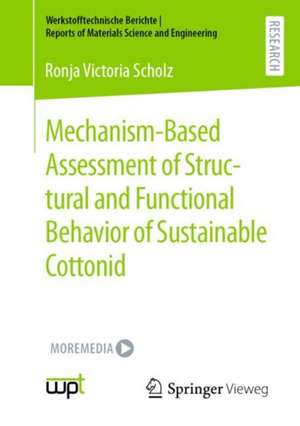Mechanism-Based Assessment of Structural and Functional Behavior of Sustainable Cottonid: Werkstofftechnische Berichte │ Reports of Materials Science and Engineering
Autor Ronja Victoria Scholzen Limba Engleză Paperback – 17 mai 2022
Preț: 693.90 lei
Preț vechi: 816.35 lei
-15% Nou
Puncte Express: 1041
Preț estimativ în valută:
132.78€ • 138.98$ • 110.51£
132.78€ • 138.98$ • 110.51£
Carte tipărită la comandă
Livrare economică 31 martie-14 aprilie
Preluare comenzi: 021 569.72.76
Specificații
ISBN-13: 9783658375393
ISBN-10: 3658375396
Pagini: 205
Ilustrații: XLIV, 205 p. 130 illus.
Dimensiuni: 148 x 210 mm
Greutate: 0.34 kg
Ediția:1st ed. 2022
Editura: Springer Fachmedien Wiesbaden
Colecția Springer Vieweg
Seria Werkstofftechnische Berichte │ Reports of Materials Science and Engineering
Locul publicării:Wiesbaden, Germany
ISBN-10: 3658375396
Pagini: 205
Ilustrații: XLIV, 205 p. 130 illus.
Dimensiuni: 148 x 210 mm
Greutate: 0.34 kg
Ediția:1st ed. 2022
Editura: Springer Fachmedien Wiesbaden
Colecția Springer Vieweg
Seria Werkstofftechnische Berichte │ Reports of Materials Science and Engineering
Locul publicării:Wiesbaden, Germany
Cuprins
1 Introduction and objective.- 2 State of the art.- 3 Cottonid.- 4 Investigation methodology.- 5 Results and discussion.- 6 Summary and outlook
Notă biografică
Ronja Victoria Scholz works as Group Leader Composites at the Chair of Materials Test Engineering (WPT) at TU Dortmund University and completed her doctorate there. She focusses on scientific issues regarding cellulose-based composite materials and sustainability in engineering.
Textul de pe ultima copertă
Ronja Victoria Scholz assesses the performance of cellulose-based Cottonid for implementation as sustainable construction material. Quasi-static and fatigue tests are performed in varying hygrothermal test conditions using mechanical testing systems in combination with integrable climate chambers. To investigate humidity-driven actuation properties, customized specimen holders are designed. Accompanying microstructural in situ experiments in analytical devices enable a profound understanding of effective material-specific damage and failure mechanisms. The findings are transferred into strength-deformation diagrams as well as Woehler curves, which enable a comparative evaluation of several process-related and environmental influencing factors and can directly be used for dimensioning of Cottonid elements for structural applications. The interpretation of thermoelastic material reponse during loading is used as scientific value for lifetime prediction. Comprehensive investigations on industrial standard materials as well as structurally optimized Cottonid variants provide a scientific basis for categorizing material’s structural and functional performance towards common technical plastics and wood.
About the Author
Ronja Victoria Scholz works as Group Leader Composites at the Chair of Materials Test Engineering (WPT) at TU Dortmund University and completed her doctorate there. She focusses on scientific issues regarding cellulose-based composite materials and sustainability in engineering.















